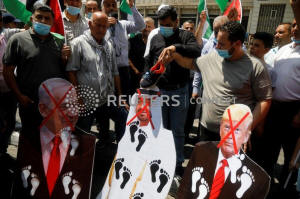Israel hails UAE deal but Palestinians - and settlers - dismayed
 Send a link to a friend
Send a link to a friend
 [August 14, 2020]
By Stephen Farrell [August 14, 2020]
By Stephen Farrell
JERUSALEM (Reuters) - Israel talked of
"history" and Palestinians of "betrayal" after Thursday's surprise
announcement of a deal to normalise relations between the Jewish state
and the United Arab Emirates.
In a nationwide televised address, Israeli Prime Minister Benjamin
Netanyahu said the deal would lead to "full and formal peace" with the
Gulf Arab state and voiced hope that other countries in the region would
follow the UAE's example.
Netanyahu said it also entailed acceding to a request from U.S.
President Donald Trump to "temporarily wait" on implementing the Israeli
leader's pledge to annex parts of the occupied West Bank.
"It’s an incomparably exciting moment, a historic moment for peace in
the Middle East," Netanyahu said.
Palestinian President Mahmoud Abbas, whose officials seemed to be taken
by surprise, issued an unusually strong condemnation of a regional Arab
neighbour and instructed the Palestinian ambassador to the UAE to return
immediately.

“The Palestinian leadership rejects and denounces the UAE, Israeli and
U.S. trilateral, surprising, announcement,” said Abbas's spokesman Nabil
Abu Rudeineh in Ramallah in the occupied West Bank.
Reading a statement on Palestinian television, Abu Rudeineh said the
leadership regarded the UAE's move as "a betrayal".
The statement urged the Arab League and the Organisation of Islamic
Cooperation to assemble to "reject" the deal, adding "neither the UAE
nor any other party has the right to speak in the name of the
Palestinian people."
The deal provides a diplomatic achievement for Netanyahu after weeks of
domestic criticism over his handling of the coronavirus pandemic and the
economy, but also angered right-wing Israeli settlers who want to annex
the West Bank.
Netanyahu said that while he had promised to apply Israeli sovereignty
to areas, including Jewish settlements, in the territory, which
Palestinians seek for a future state, he had made clear he first needed
a green light from Washington.
"He deceived us. He has deceived half a million residents of the area
and hundreds of thousands of voters," said David Elhayani, head of the
Yesha Council of settlers.
[to top of second column]
|

Palestinians take part in a protest against the United Arab
Emirates' deal with Israel to normalise relations, in Nablus in the
Israeli-occupied West Bank August 14, 2020. REUTERS/Raneen Sawafta

PRO-ISRAEL STANCE
Abbas, who heads the Palestinian Authority and the umbrella
Palestine Liberation Organization, has refused all political
dealings with the Trump administration for more than two years,
accusing it of taking a consistently pro-Israel stance.
Hanan Ashrawi, a veteran Palestinian negotiator, told Reuters: “We
were blindsided. Their secret dealings are now completely out in the
open. It is a complete sell-out.”
Much use was made of the word "normalisation" - a term that has very
different connotations on either side.
For Israel and the White House it signified a welcome rapprochement
with a key Gulf player in a region from which Israel has long been
isolated, aside from two peace treaties with its immediate
neighbours Egypt and Jordan.
But for many Palestinians and Arabs in other countries, the word has
overwhelmingly negative connotations.
In Gaza, Fawzi Barhoum, a spokesman for Hamas, told Reuters:
“Normalisation is a stab in the back of the Palestinian cause, and
it serves only the Israeli occupation.”
In a rare show of unity, Hamas leader Ismail Haniyeh spoke to Abbas
by phone to convey his "absolute rejection" of the deal, Hamas
officials said.
There was no official reaction or media coverage in Saudi Arabia,
but some Saudis tweeted under hashtags “normalization is treason”,
“UAE” and “Israel.”
Mohammed Ali al-Houthi, the head of Yemen's Iran-aligned Houthi
group’s Supreme Revolutionary Committee, said the deal was a
betrayal of the Palestinian cause and of pan-Arabism.
(Writing by Stephen Farrell; Reporting by Jeffrey Heller and Maayan
Lubell in Jerusalem, Rami Ayyub in Tel Aviv, Ali Sawafta in Ramallah
and Nidal al-Mughrabi in Gaza, Marwa Rashad in Riyadh and Lisa
Barrington in Dubai.; Editing by Sonya Hepinstall)
[© 2020 Thomson Reuters. All rights
reserved.] Copyright 2020 Reuters. All rights reserved. This material may not be published,
broadcast, rewritten or redistributed.
Thompson Reuters is solely responsible for this content. |